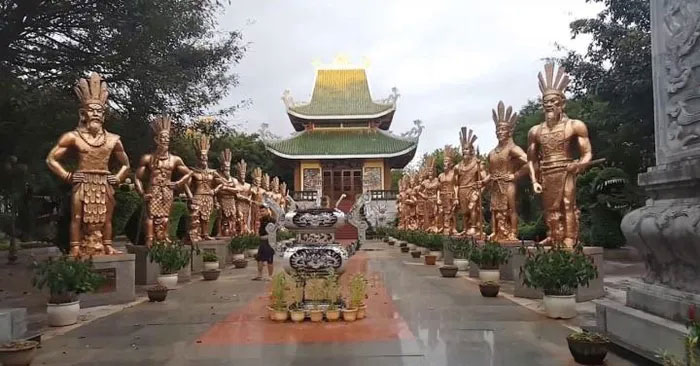The Hùng Dynasty – the first dynasty of the Vietnamese people, is believed to have existed from around the 3rd millennium BC until approximately the 3rd century BC. Our understanding of this dynasty comes not from official historical records but from legends and folk tales. One of the oldest texts that provide significant information about this dynasty is the “Ngọc phả Hùng Vương,” compiled by the royal scholar Nguyễn Cố in the first year of the Hồng Đức era (1470, during the reign of King Lê Thánh Tông).
The “Ngọc phả Hùng Vương” consists of 21 pages, 42 pages of Chinese characters, totaling nearly 10,000 words. It not only specifies the royal titles and achievements of each Hùng king but also records their lifespans and years of reign.

The Hùng kings are known for their longevity, according to the Ngọc phả Hùng Vương.
According to the records, the throne of the Hùng kings was passed down through 18 generations, starting with Kinh Dương Vương (some other legends regard the grandson of Kinh Dương Vương, the son of Lạc Long Quân and Âu Cơ, as the first Hùng king), who reigned for 215 years and lived to be 260 years old. His son, Lạc Long Quân – the second king of the Hùng dynasty, known as Hùng Hiền Vương, is noted for having the longest lifespan – 420 years, and he reigned for 400 years.
The third king, Hùng Quốc Vương, lived as long as his grandfather – 260 years, and reigned for 221 years. The next in line was Hùng Việp Vương, whose age is not recorded in the text, but it states that he reigned for 300 years, suggesting that his lifespan exceeded that of the Chinese figure Pangu.
One of the Hùng kings with the most modest lifespan, according to the “Ngọc phả,” is Hùng Huy Vương (the 6th generation), who lived “only” 100 years and reigned for 87 years. In contrast, his son, known to all Vietnamese as Lang Liêu, ascended to the throne as Hùng Chiêu Vương and ruled the land of Văn Lang for 200 years.
Other kings are not specifically noted for their lifespans, but their reigns also lasted around a century:
- 8th generation: Hùng Vĩ Vương, reigned for 100 years.
- 9th generation: Hùng Định Vương, reigned for 80 years.
- 10th generation: Hùng Uy Vương, reigned for 90 years.
- 11th generation: Hùng Trinh Vương, reigned for 170 years.
- 12th generation: Hùng Vũ Vương, reigned for 96 years.
- 13th generation: Hùng Việt Vương, reigned for 105 years.
- 14th generation: Hùng Anh Vương, reigned for 99 years.
- 15th generation: Hùng Triều Vương, reigned for 94 years.
- 16th generation: Hùng Tạo Vương, reigned for 92 years.
- 17th generation: Hùng Nghị Vương, reigned for 160 years.
- 18th generation: Hùng Tuyền Vương, reigned for 115 years.
In reality, the average lifespan of people living thousands of years ago was very low. Even the kings of later dynasties, recorded in official histories, had modest lifespans. A study shows that the average lifespan of Vietnamese kings (based on data from 90 individuals) was 44.2 years, with only 12% living beyond the age of 60.
Regarding the several hundred years of longevity attributed to the Hùng kings, historian Ngô Thì Sĩ questioned in his work Việt Sử tiêu án written in 1775: “People are not made of gold or stone; how could they live so long? This is even harder to understand.”
To explain this, there is a viewpoint that many historians tentatively accept: the 18 Hùng kings did not refer to 18 specific individuals but rather to 18 branches, with each branch having multiple kings who alternated in ruling and shared the royal title. Many believe that the number 18 is symbolic, as it is a multiple of 9 – a sacred number for the Vietnamese; thus, 18 generations of kings imply many Hùng kings ruling in succession.
Regardless, when exploring the legendary kings, we should not “count” using precise statistical data. On the other hand, the attribution of “unbelievable” lifespans to ancient kings and leaders is common in many cultures. For instance, all three legendary kings of ancient China (commonly referred to as the Three Sovereigns) are noted for their extraordinary longevity. Among them, Fuxi reigned for 115 years (some texts record 121 years); Shennong ruled for 140 years, and the Yellow Emperor (Xuanyuan) lived for 113 years, reigning for 99 years.
According to Jewish tradition (as reflected in the Hebrew Bible and the Old Testament), tribal leader and one of their patriarchs – Abraham, lived to be 175 years old. This number pales in comparison to his ancestors: Adam lived for 930 years; Noah – the builder of the ark that survived the great flood – lived for 950 years. It seems that when mythologizing great figures, ancient people often attributed supernatural lifespans to emphasize that they were different from ordinary people.
The Vietnamese view of the Hùng Vương dynasty – the legendary kings during the nation’s founding – is no different.

















































